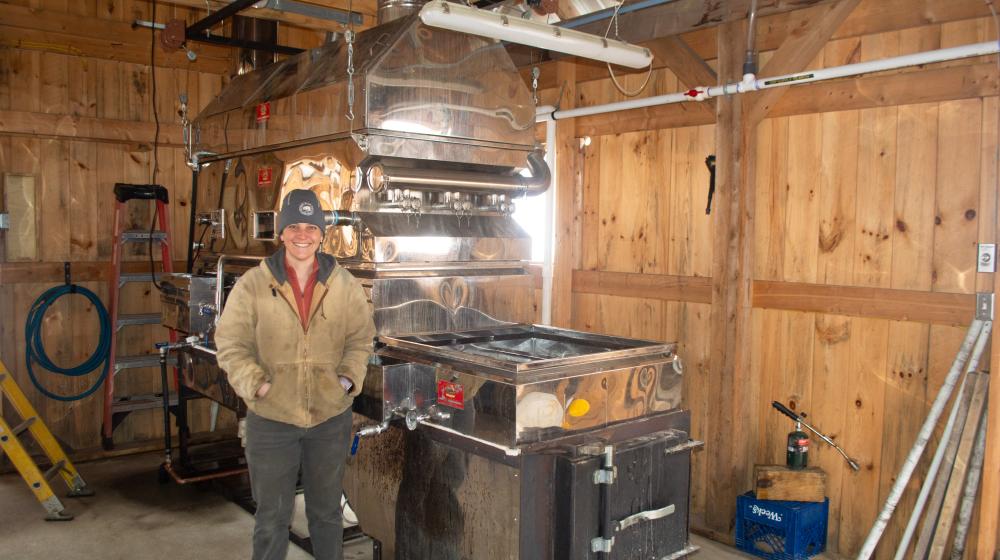
“We are not the first to sugar here,” says Kate Goyette of Sweet Bear Farm in Corinth, “but we do it differently than they did.” She nods at a rusted boiling arch on an ancient stone foundation, saplings and soil consuming the twisted metal in a relentless march of decades that long ago claimed its protective wooden shack. Among the maples surrounding the monolith, zigzagging blue tubing conducts sap to an unseen collection tank by way of vacuum suction. Her reflective smile honors a place she loves and a time she can only imagine.
Kate and husband Jeremiah provide maple syrup, firewood, and humanely raised meat to local customers. Though sugaring produced a little less than 200 gallons in 2024, there is no grand plan to expand—only improve. After building their sugarhouse by hand in 2017, the Goyettes installed vacuum pumps and lines, and later, with help from a USDA Rural Energy for America Program (REAP) grant, a steamaway evaporator unit. According to Kate, the constantly supplied 200° water reduces their wood fuel consumption by roughly 35 percent annually. Recently, another REAP grant secured the Goyettes a reverse-osmosis (RO) machine, saving them an additional $1,650/year.
REAP has a less well-known but still potent partner in creating opportunities for small ag businesses. USDA’s Value Added Producer Grant program (VAPG) helps entrepreneurial outfits like Runamok Maple in Fairfax and Moose Mountain Maple in Underhill develop new products and markets. The two programs create economic victories for producers who are making the good stuff more efficiently and creatively than ever before, whether they tap 500 or 50,000 trees.
Silloway Maple in Randolph operates at roughly 27,000 taps, according to Maple Producer Marilyn Lambert. “Our staff are family and friends, and that works at the level we’re comfortable with,” she says. “Now, if someone has a prime forest and wants to lease it out, we’ll get in there and make it work. But right now, we’re good with what we’re doing.”
What they’re doing is making exquisite maple products while driving down costs with two roof-mounted solar arrays, courtesy of REAP grants, and a 12-filter reverse osmosis (RO) unit. Forest Manager David ‘Jake’ Jacobs wants to implement more tech. “The new vacuum screw pumps are great,” he says. “Those would make a big difference. We’ll be looking into those soon, I hope.”
Industry innovation is constantly reducing the energy inputs and time of a notoriously inefficient process, and REAP is USDA Rural Development’s most popular business program in Vermont as a result. In the world of sugaring, these upgrades can include steamaways, RO units, electric evaporators—and vacuum screw pumps. By implementing the newest technology at a huge discount, small to medium Vermont maple producers are saving money and time while doing their part in the fight against climate change.

